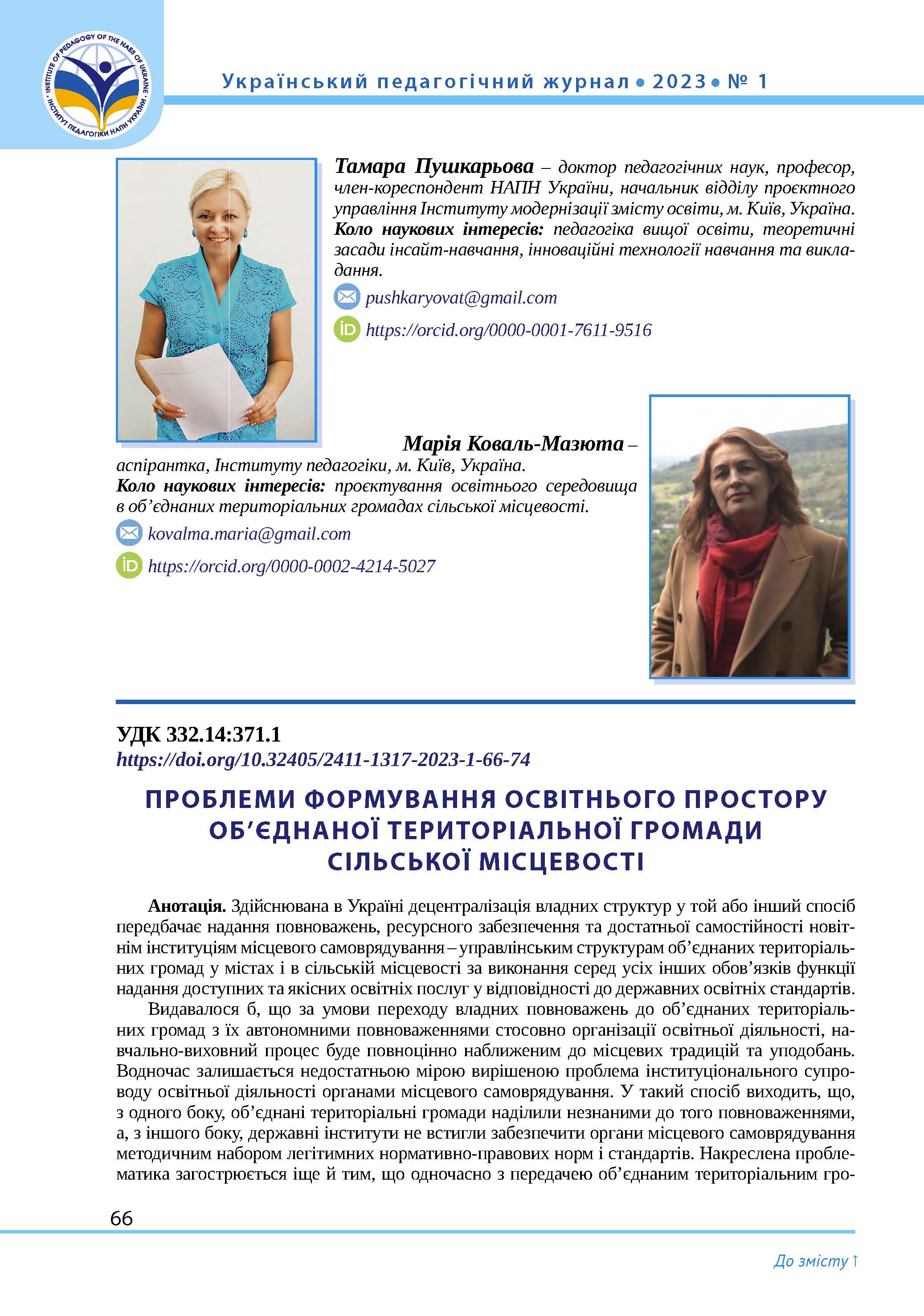Abstract
The decentralization of power structures carried out in Ukraine in one way or another provides for the provision of powers, resource provision and sufficient independence to the newest institutions of local self-government – the management structures of united territorial communities in cities and in rural areas for the performance, among other duties, of the function of providing accessible and quality educational services in accordance with state educational standards.
It would seem that under the condition of the transfer of power to the united territorial communities with their autonomous powers in relation to the organization of educational activities, the educational process will be fully close to local traditions and preferences. At the same time, the problem of institutional support of educational activities by local self-government bodies remains insufficiently resolved. In this way, it turns out that, on the one hand, united territorial communities were given previously unknown powers, and, on the other hand, state institutions did not have time to provide local self-government bodies with a methodical set of legitimate legal norms and standards. The outlined problems are further exacerbated by the fact that simultaneously with the transfer of education management functions to the united territorial communities, the state entrusts their regional structures with the responsibilities of providing health care, communal services, social protection, sports, culture, employment, etc. The indicated functions are to some extent familiar to rural united territorial communities, while rural united territorial communities express enough cautions and questions both in the organizational and methodical sense due to the lack of experience, finances and qualified specialists.
In this way, one of the tasks of the scientific community under the conditions of decentralization of education is the study of potential problems, obstacles and risks that may arise during the construction of educational space in the united territorial communities of rural areas, and the determination of rational ways to minimize them or gradually reduce and eliminate them.
References
Білодід, І.К. (ред). (1971). Словник української мови: в 11 т. Т. 2: Г-Ж. Київ: Наукова думка.
Білодід, І.К. (ред). (1974). Словник української мови: в 11 т. Т. 5: Н-О. Київ: Наукова думка.
Дзвінчук, Д.І. (2018). Основні вектори розробки та реалізації освітньої політики в контексті політики децен-тралізації в Україні. Гуманітарний вісник ЗДІА. Вип. 72. 125–136.
Застрожнікова, І.В. (2019). Принципи децентралізації в управління освітою Науковий вісник: Державне управління. 2. 59–65.
Клокар, Н.І., Науменко, Г.Г., Гунько, Л.В. (2017). Освіта в об’єднаних територіальних громадах: нові підходи до управління в умовах децентралізації. Рідна школа. 11. 27–31.
Кристопчук, Т.Є. (2016). Особливості децентралізації управління освітою: досвід європейських країн. Психолого-педагогічні основи гуманізації навчально-виховного процесу в школі та ВНЗ. 2. 108–117.
Лопушинський, І., Ковнір, О. (2017). Стан та перспективи реформування освіти в умовах децентралізації лади в Україні. Теорія та практика державного управління і місцевого самоврядування. 1. http: elzbirn-du.at.ua/2017_1/27.pdf.
Макарова, В.В. (2017). Вплив суб’єктного фактора на формування усталеної структури системи. Науковий вісник Ужгородського національного університету. Вип.13. Ч. 2. 13–17. http: www.visnyk-ekon.uzhnu.edu.ua.
Мелешко, В. (2018). Особливості управління опорними закладами освіти в умовах децентралізації. Педагогічна освіта: теорія і практика. 25. Т. 1. 113–120.
Мельничук, О.С. (ред.). (1985). Словник іншомовних слів. Київ: Головна редакція української радянської енциклопедії.
Пехник, А. В. Кройтор, А.В., Завгородня, Ю.В. (2019). Теорія ризику: історія та сучасні підходи. Актуальні проблеми політики. 63. 33–47.
Пушкарьова, Т.О. (2021). Актуальні питання децентралізації управління освітою у контексті положень теорії ризику. Збірник матеріалів всеукраїнської науково-практичної конференції «Трансформації в сучасному освітньому просторі: глибинні аспекти розвитку освіти». Суми: ТОВ НВП «Росток А. Т.В.». 26–31.
Сидоренко, В.В. (2018). Методична діяльність в умовах децентралізації освіти в Україні. Міжнародної науково-практичної конференції «Неперервна освіта нового сторіччя: досягнення та перспективи» Запоріжжя (14–21 травня 2018 р.). http:/drive.google.com/file/d/view.
Тарасенко, Н. (2020). Децентралізація освіти в Україні: плани, проблеми, перспективи. http://xn‑80aidiauz.xn.-80ao2a3f.xn-j1amh/160.
Устенко, О.Л. (1997). Теорія економічного ризику: монографія. Київ: МАУП.
Юрчук, Л. (2009). Тенденції децентралізації управління освітою в Україні. Вісник національної академії державного управління при Президентові України. 4. 276–283.

This work is licensed under a Creative Commons Attribution-NonCommercial-ShareAlike 4.0 International License.


